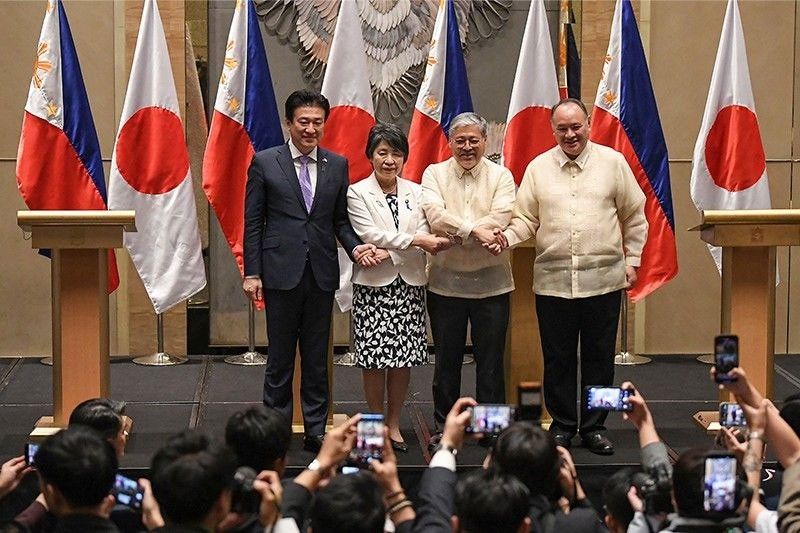No military facilities under Philippines-Japan pact

MANILA, Philippines — There is nothing in the Philippines-Japan Reciprocal Access Agreement (RAA) that sets the legal foundation for the establishment of military facilities in both countries, according to the Japanese foreign ministry.
“Nothing in this agreement shall be construed as providing a basis for a Party to establish its military facilities in the territory of the other Party,” Mariko Kaneko, deputy press secretary of the Japanese foreign ministry, said at a briefing after the signing of the agreement on Monday at Malacañang.
The signing followed the second Japan-Philippines Foreign and Defense Ministers Meeting (“2+2”).
“So no misunderstanding on both sides, not to have a military base in another country. It does not provide legal foundation (for establishment of military facilities),” Kaneko said.
The signing of the RAA came shortly after Japan’s Foreign Minister Yoko Kamikawa and Defense Minister Minoru Kihara met with President Marcos at Malacañang.
The RAA, which allows Japanese and Filipino forces to enter each other’s country for joint military exercises, was signed by Defense Secretary Gilbert Teodoro Jr. and Kamikawa in ceremonies witnessed by Marcos, Foreign Affairs Secretary Enrique Manalo and Kihara.
The defense agreement will take effect after ratification by the two countries’ legislatures.
Kaneko said Japan is “much concerned” about China’s dangerous actions in the East and South China Seas, including the June 17 violent disruption by the Chinese coast guard of a resupply mission to BRP Sierra Madre in Ayungin Shoal.
“Japan supports the position that China should uphold the international order and raise this issue to the Chinese government. We have been doing so and raise the voice in the international community so China will not be able to do such act, unilateral act, use of force to change the status quo,” she stated.
Kaneko stressed that Japan is fully supportive of the Philippines’ firm stand against unilateral action by China or any other country to change the status quo in the region.
She underscored the unwavering commitment of the Philippines and Japan to freedom of navigation and overflight.
Earlier, Manalo, Teodoro, Kamikawa and Kihara met in Manila for discussions on the current bilateral security environment and on regional issues, including the situation in Taiwan and the Korean Peninsula.
They emphasized the need for the international community to speak out on the importance of maintaining and strengthening a free and open international order based on the rule of law.
Close scrutiny
While it may have already gained early support from some senators, the RAA will still be subject to close scrutiny by the Senate before it gets ratified, Senate President Francis Escudero said yesterday.
“We will scrutinize it like other treaties that the Senate is asked to ratify by the Executive,” Escudero said.
He said the agreement has yet to be submitted to the Senate for ratification. “I personally welcome this agreement because it will strengthen and firm up our position on the issue with China on the West Philippine Sea. But there is no substitute for beefing up our armed forces on our own. And while we’re not yet there, it is good that we have arrangements like this to strenghten our position and situation,” he said.
Sen. Nancy Binay said she would vote for the ratification of the RAA, as she called the deal a representation of the country’s commitment to peace and security in the region.
“Since 2022, former Senate president Migz Zubiri and then-ambassador to the Philippines Koshikawa Kazuhiko consistently pushed for the crafting of a
RAA between the Philippines and Japan,” she said.
“The signing of the RAA is the fruit of the Senate’s effort for peaceful resolutions to maritime conflicts in the Asia-Pacific Region, an assertion to our territorial rights and a reiteration of the Philippines’ adherence to defend its national sovereignty,” she pointed out.
“The RAA’s value to National Security underscores how increased maritime security cooperation safeguards Philippine economic interests,” Binay said.
Sen. Bong Go said the signing of the RAA is in the best interest of Filipinos.
“The interest of the people, the interest of Filipinos, if it is good for the people, we will support it,” Go said.
For Speaker Martin Romualdez, the RAA is a “proactive approach in addressing security challenges and promotes a rules-based international order.”
He said the agreement sets “a foundation for expanded defense collaboration that is poised to contribute significantly to regional peace and stability.”
“The signing of the RAA signifies a crucial moment in Philippine-Japan relations, heralding a new era of strengthened defense cooperation amid evolving regional geopolitical challenges,” he said in a statement.
The landmark agreement, he maintained, allows expanded participation of Japanese forces in joint military exercises such as the Balikatan drills with the Philippines and the US, “marking a significant step forward in regional security efforts.”
He added an RAA is important in enhancing defense capabilities and fostering deeper strategic ties between Manila and Tokyo.
“The RAA highlights our shared commitment to regional stability and security, strengthening our defense capabilities and reaffirming the Philippines’ strategic partnership with Japan,” he maintained.
He said the agreement reflects the two countries’ “shared values of peace, stability and prosperity in the region.” — Cecille Suerte-Felipe, Sheila Crisostomo
- Latest
- Trending





























